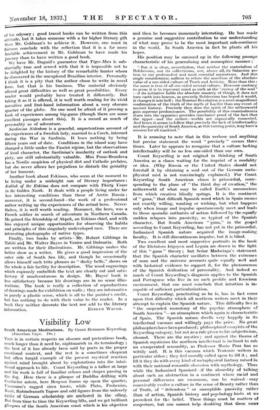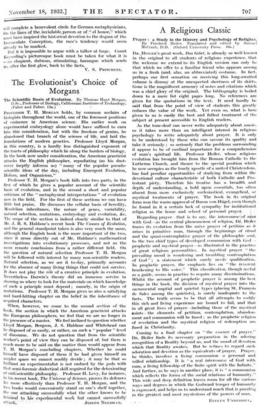Visibility Low
South American Meditations. By Count Hermann Keyserling. (Jonathan Cape. 18s.) Tins is in certain respects an obscure and pretentious book, much longer than it need be, nightmarish in its terminology ; the best of it has already been said by poets in the proper emotional context, and the rest is a sometimes eloquent but often turgid example of the present mystical reaction against mind brought about by explorations into the intui- tional approach to life. Count Keyserling is a talker at large and his work is full of familiar echoes and shapes passing in the fog. Here there is a glimpse of Buddha drifting with Confucius astern, here Bergson foams up upon the quarter, Unamuno's ragged siren hoots, while Plato, Frobenius, Kant, Rabindranath Tagore and odd figures from the unlovely ranks Of German scholarship are anchored in the offing. But from time to time the Keyserling lifts, and we get brilliant Illanipses of the South American coast which is his objective
and then he becomes immensely interesting. He has made a genuine and suggestive contribution to our understanding of what may prove to be the most important sub-continent in the world. In South America in fact he plants all his hopes.
His position may be summed up in the following passage characteristic of his -generalizing and assumptive manner : "But it is clear, nevertheless, that neither the materialism of Bolshevism, nor its collectivism, nor, above all, its Satanism are true to our profoundest and most essential aspirations. And this single consideration suffices to refute the assertion of the absolute value of a one-sided culture of Truth and Activity. More than this : the same is true of all one-sided mental culture. However contrary to sense it is to represent mind as such as the enemy of tho soul' —1f its initiative holds the absolute mastery of things, it does not turn earth into heaven, as precisely Bolshevism has hoped it would, it changes it into hell ; the Russian Revolution is a more magnificent confirmation of the truth of the myth of Lucifer than any event of ancient history. Precisely then does the spirit of the netherworld gain supreme predominance. Tho possibility of this enantiodromia (turn into the opposite) provides conclusive proof of the fact that the upper—and the nether—worlds are organically connected. And hence it seems to follow that precisely the lack of intellectuality and the passivity of South America, at this turning point, may have a mission for-all mankind."
It is amusing to note that in this verbose and 'anything but precise statement the word " precisely " occurs three times. Later he appears to recognize that a culture lacking intellectuality will be no less one-sided than our own.
Count Keyserling is not original in thinking of South America as a chaos waiting for the imprint of a modality or idea. (Why Russia or the United States should not forestall it by obtaining a soul out of the German meta- ' physical mist is not convincingly explained.) For Count Keyserling South American chaos is primordial, corre- sponding to the plane of "the third day of creation," the nether-world of what may be called Earth's unconscious from which creation blindly springs. It is the continent of " gana," that difficult Spanish word which in Spain means not exactly willing, wanting or wishing, but what happens only when image and impulse spontaneously meet and leads to those sporadic outbursts of action followed by the equally sudden relapses into passivity, so typical of the Spanish character. But South American " gana," in the gospel according to Count Keyserling, has not yet in the primordial, Indianized Spanish nature acquired the image-making faculty. It is still discontinuous impulse, but it is blind.
Two excellent and most suggestive portraits in the book of the Dictators Irigoyen and Leguia are drawn in the light of this " gana " theory ; but Senor Madariaga's statement that the Spanish character oscillates between the extremes of man and the universe accounts quite equally well and with historical evidence to support it, for the phenomenon of the Spanish deification of personality. And indeed so much of Count Keyserling's diagnosis applies to the Spanish and Portuguese who live in no such prolific and ferocious environment, that one must conclude that intuition is in- capable of sufficient particularization. - Count Keyserling, penetrating as he is, has in fact come upon that difficulty which all northern writers meet in their attempt to explain the Spanish nature. This difficulty lies in "the suspended monotony of the psychic atmosphere of South America "—an atmosphere which again is characteristic of Spain. The Spanish nature dwells very happily in its intellectual vacuum and willingly pays the price. No great philosophers have been produced; philosophical essayists of the Keyserling category, but not as a rule given to his subjectivism, abound. There are the mystics ; and against the thorns of Spanish mysticism the northern intellectual is inclined to rub an exasperated sensuality, as Professor Mario Praz has so wittily said. It is this vacuum which Teutonic writers in particular abhor ; they feel morally called upon to fill it ; and fill it they do with every kind of metaphysical fantasy mixed in with their national romantic obsession with mythology. Thus while the Indianized Spaniard—if the absurdity of talking about such an abstraction in a continent where racial and personal differences are enormous, can be waived—may conceivably evolve a culture in the sense of Beauty rather than of Truth, of " delicadeza " or susceptible passivity rather than of action, Spanish history and psychology hints at no precedent for fir: belief. These things must be matters of eonjeeture, but one cannot help doubting that these races will complete a benevolent circle for German metaphysicians. On the lines Of the_inviolable_person.or of _`! el honor,'! which must have inspired the historical devotion to the dogma of the Immaculate Conception, the race's tendency would seem already to be marked.
But it is impossible to argue with a talker at large. Count Keyserling's picturesque book must be taken for what it is eloquent, dubious, stimulating, harangue which sends us, after the first glow, back to the facts.
V. S. PRFFCRETT.

































































 Previous page
Previous page